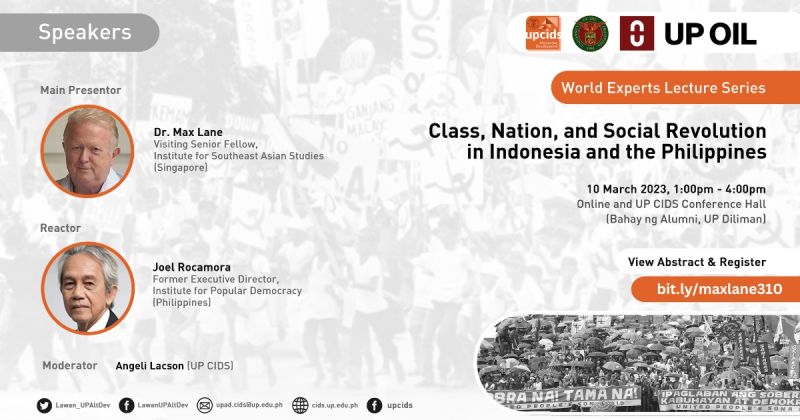Class, Nation, and Social Revolution in Indonesia and the Philippines | A Public Lecture

Everyone is invited to a talk, Class, Nation, and Social Revolution in Indonesia and the Philippines, by Max Lane, on 10 March 2023, 1:00 PM-4:00 PM, online via Zoom and at the UP CIDS Conference Hall, Ang Bahay ng Alumni, UP Diliman. The event is free and open to the public, but seating is first-come, first-served. Snacks will be served onsite. Pre-registration is encouraged. All registrants who register(ed) will receive a link to the Zoom session.
SIGN UP: YES, I WILL ATTEND!
ABSTRACT
In advanced industrial societies, the conception of an anti-capitalist social revolution has always been understood as a process whereby the proletarian class created and grown by industrialisation will organise politically and overthrow the capitalist class and seize from them both the commanding heights of the economy as well as establish a new state power. As we move into the 21st century, it has become clear that the ability to “constantly revolutionise the means of production” and this industrialise the whole economy and society remains monopolised by the tiny handful of imperialist states – “the West” and Japan.
While a few large Third World countries – in particular China – have made massive strides over the last 75 years, they too remain contained, though they now actively challenge that containment. In other smaller Global South countries, such as Indonesia and the Philippines, there is virtually no process of industrialisation, with just tiny pockets of law level manufacture and assembly. This situation constrains the development of a modern proletariat, both in size and consciousness. Formal education systems are not constructed for an industrialising society. Education through the experience of exposure to industry and a society which itself is industrialisation is also weak, or not present at all. Among the stunted capitalist class, the scale of capital accumulation is negligible and dependent on rent.
Anti-capitalist political struggle in “the West”, especially socialist struggle, was underpinned by an industrialising society coming after the scientific and bourgeois revolutions. The great 19th century socialists, such as Marx, were building upon the revolution in culture that had already seriously begun. In Indonesia and the Philippines, although to different degrees and in their own way, face the challenge of developing an anti-capitalist process of transformation without either an industrializing society, with the capacity to produce abundance, or a completed national and cultural revolution. There is much more to an uncompleted national (democratic) revolution than the land question, as crucial as it also is. The modern working class is miniscule, while the informal proletariat and rural working masses are the majority.
If a national revolution is unfinished, what forces can be the agency for completing it? Is completing such a national and cultural revolution possible in this era without a simultaneous social revolution? What is the relationship between class and nation as agency for transformational change?
SPEAKER and REACTOR
Max Lane is a scholar-activist and expert on Indonesian politics and society. The translator into English of Praemodya Ananta Toer’s Buru Quartet, he is Visiting Senior Fellow, Institute of Southeast Asian Studies in Singapore. Max Lane is also the author of, among other books, The Urban Mass Movement in the Philippines 1983-1987 (1990) and Indonesia Out of Exile How Pramoedya’s Buru Quartet Killed a Dictatorship (forthcoming 2023).
Joel Rocamora (the reactor) is former Executive Director, Institute for Popular Democracy. He is the author Nationalism in Search of Ideology: The Indonesian Nationalist Party, 1946-1965.
ABOUT
The event is part of the UP World Experts Lecture Series, and organized by the Program on Alternative Development (AltDev), Center for Integrative and Development Studies, University of the Philippines; and the UP Office of International Linkages. For inquiries, please contact AltDev at [email protected]
The Program on Alternative Development (AltDev) aims to look at paradigms, policies, practices, and projects that are largely marginalized and excluded from the mainstream. The program aims to bring these alternatives out of the margins and into the mainstream to level the playing field so that they may be regarded on an equal footing with dominant discourses and thus offer alternatives to the existing system. Recently, AltDev published the conference proceedings, “Advancing and Realizing Alternative Regionalism: Southeast Asian Peoples’ Solidarity and Resistance in COVID-19 Times.”